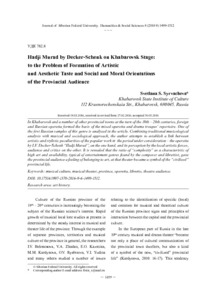Hadji Murad by Decker-Schenk on Khabarovsk Stage: to the Problem of Formation of Artistic and Aesthetic Taste and Social and Moral Orientations of the Provincial Audience
Скачать файл:
URI (для ссылок/цитирований):
https://elib.sfu-kras.ru/handle/2311/20354Автор:
Syrvacheva, Svetlana S.
Сырвачева, С.С.
Дата:
2016-06Аннотация:
In Khabarovsk and a number of other provincial towns at the turn of the 19th – 20th centuries, foreign
and Russian operetta formed the basis of the mixed operetta and drama troupes’ repertoire. One of
the first Russian samples of this genre is analyzed in the article. Combining traditional musicological
analysis with musical and sociological approach, the author attempts to establish a link between
artistic and stylistic peculiarities of the popular work in the period under consideration – the operetta
by I.F. Decker-Schenk “Hadji Murad”, on the one hand, and its perception by the local artistic forces,
audience and critics on the other. It is revealed that the ratio of “complexity” as a characteristic of
high art and availability, typical of entertainment genres found by the composer and librettist, gave
the provincial audience a feeling of belonging to art, at that theater became a symbol of the “civilized”
provincial life В Хабаровске и ряде других провинциальных городов на рубеже XIX-XX веков зарубеж-
ная и отечественная оперетта составила основу репертуара смешанных опереточно-
драматических трупп. В статье анализируется один из первых отечественных образцов это-
го жанра. Совместив традиционный музыковедческий анализ с музыкально-социологическим
подходом, автор предпринимает попытку установления связи между художественно-
стилистическими особенностями популярного в рассматриваемый период сочинения – опе-
ретты И.Ф. Деккер-Шенка «Хаджи-Мурат», с одной стороны, и ее восприятием местными
артистическими силами, публикой и критикой, – с другой. Выявлено, что найденное компо-
зитором и либреттистом соотношение «сложности», как атрибута высокого искусства,
и доступности, свойственной развлекательным жанрам, давало провинциальному зрителю
ощущение приобщенности к искусству, при этом театр становился символом «цивилизо-
ванной» провинциальной жизни

